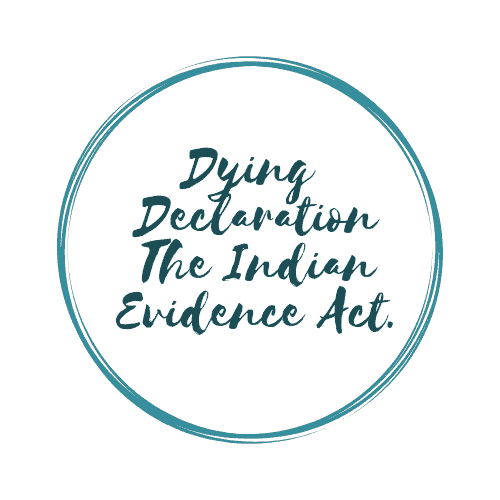AUTHORED BY: MR. AVINASH PANDEY, B.B.A.LL.B, 2ND YEAR STUDENT AT IFIM LAW COLLEGE & RESEARCH WRITER AT LAW AUDIENCE
INTRODUCTION:
Section 32 (1)[1] of ‘The Indian Evidence Act, 1872’ explains the concept of Dying Declaration. A declaration by a person who is conscious and recognises that death is expected concerning what he or she deems to be the cause or conditions of death that can be injected into testimony during a hearing in particular matters. A dying declaration is viewed as reliable and dependable testimony based upon the prevailing assumption that most people who understand that they are about to depart do not lie. As a conclusion, it is exclusion to the Hearsay rule, which prevents the use of a declaration made by someone other than the person who repeats it while proving during a trial, because of its essential untrustworthiness.
KEYWORDS: TESTIMONY, HEARSAY RULE, DECLARATION, TRIAL
AUTHORIZATION TO EXTRACT DYING DECLARATION:
- a) According to the prescribed guidelines of the apex court, there is no specific method of taking dying declaration; however, anyone can register the same.
- b) It could be recorded before the magistrate also.
- c) It can also be recorded by the public servants, doctors, family members, in the case where the patient is terribly burnt or having a pathetic condition.
- d) If the statements are not registered by the magistrate then, in that case, to make it legal, it is suitable that signs of the onlookers are taken who are existing at the time of registering the dying declaration. It is notable that when the declarant is providing the record, he must be in the sound humour of mind.
SOME LANDMARK JUDGMENTS PERTAINING TO DYING DECLARATION:
In the case of Uka Ram v. State of Rajasthan the Hon’ble court held that, “[2]when a statement is made by a person as to cause of his death or as to any circumstances of transaction which resulted into his death, in case in which cause of his death comes in question is admissible in evidence, such statement in law are compendiously called dying declaration”.
In the case of [3]Chirra Shivraj v. State of Andhra Pradesh the hon’ble court held “that a mechanical approach in relying upon the dying declaration just because it is there, is extremely dangerous. The court has to examine a dying declaration scrupulously with a microscopic eye to find out whether the dying declaration is voluntary, truthful, made in a conscious state of mind and without being influenced by other persons and where these ingredients are satisfied, the Court expressed the view that it cannot be said that on the sole basis of a dying declaration, the order of conviction could not be passed”.
In the case of [4]Shudhakar Vs. State of M.P. the apex court held that “The court should ensure that the statement was not as a result of tutoring or prompting or a product of imagination. It is for the court to ascertain from the evidence placed on record that the deceased was in a fit state of mind and had ample opportunity to observe and identify the culprit. Normally, the court places reliance on the medical evidence for reaching the conclusion whether the person making a dying declaration was in a fit state of mind, but where the person recording the statement states that the deceased was in a fit and conscious state, the medical opinion will not prevail, nor can it be said that since there is no certification of the doctor as to the fitness of mind of the declarant, the dying declaration is not acceptable. What is essential is that the person recording the dying declaration must be satisfied that the deceased was in a fit state of mind. Where it is proved by the testimony of the Magistrate that the declarant was fit to make the statement without there being the doctor’s opinion to that effect, it can be acted upon provided the court ultimately holds the same to be voluntary and truthful”.
In the landmark case of [5]Up vs Madan Mohan the Hon’ble apex court stated that “It is for the court to see that dying declaration inspires full confidence as the maker of the dying declaration is not available for cross-examination, Court should satisfy that there was no possibility of tutoring or prompting, Certificate of doctor should mention that victim was in a fit state of mind, Magistrate recording his own satisfaction about the fit mental condition of the declarant was not acceptable especially if the doctor was available, Dying declaration should be recorded by the executive magistrate & police officer to record the dying declaration only if condition of the deceased was so precarious that no other alternative was left”.
CONCLUSION:
After considering numerous opinions of different courts it has been crystal clear that while recording dying declaration certain guidelines have to be followed diligently. Court has the power to reject the dying declaration on the grounds of the validity of the record by considering it as an unreliable source of evidence. The conviction can be based on it without corroboration if it is valid and intentional. Declaration is admissible on the sole ground that it was made in extremis. And in India, its admissibility is explained in Sec-32(1) of Indian Evidence Act. It is cleared by the above mentioned statements given by different courts that dying declaration can be in any form but it must be recorded carefully & duly proved, which the courts make admissible as the “DYING DECLARATION”.
[1] Cases in which statement of relevant fact by person who is dead or cannot be found, etc ., is relevant: Statements, written or verbal, of relevant facts made by a person who is dead, or who cannot be found, or who has become incapable of giving evidence, or whose attendance cannot be procured without an amount of delay or expense which, under the circumstances of the case, appears to the Court unreasonable, are themselves relevant facts in the following cases: (1) When it relates to cause of death: When the statement is made by a person as to the cause of his death, or as to any of the circumstances of the transaction which resulted in his death, in cases in which the cause of that person’s death comes into question. Such statements are relevant whether the person who made them was or was not, at the time when they were made, under expectation of death, and whatever may be the nature of the proceeding in which the cause of his death comes into question.
[2] Uka Ram vs State Of Rajasthan 10 April, 2001.
[3] Chirra Shivraj v. State Of A.P 26 November, 2010.
[4] Shudhakar v. State of M.P. 17 July, 2000.
[5] State Of U.P. v. Madan Mohan And Ors. on 20 April, 1989.



